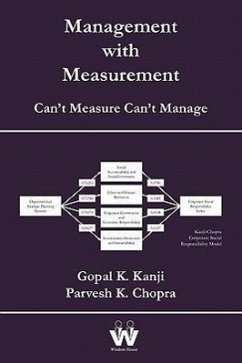A phenomenon is ever-changing, multifarious, intricate, unique in nature, type and magnitude in this complex world where actions, situations, activities,entities and processes are different at different times. The management of such a phenomenon becomes challenging due to underlying complexity, unknown/unseen interactions and different conditions.Consequently the management of such a phenomenon requires measurement. If you can't measure it, you can neither manage it nor improve it properly and effectively. Therefore the twin objectives of the present volume are: firstly, to develop the different structural models to establish potential causal relationships between endogenous and exogenous variables of a phenomenon based on path analysis. Secondly to transform the structural models into measurement models in order to deliver comprehensive, flexible versatile and robust measurement systems to measure a phenomenon or entity as a system in its totality, to be able to take the right actions and policy prescriptions. This book primarily deals with Business and Organisational Excellence and presents and delineates robust models such as Kanji's Total Quality Management Model, Kanji's Business Excellence Model, Kanji-Chopra Corporate Social Responsibility Model, Kanji-Chopra Performance Excellence Model, Kanji-Chopra Work Well-being Model and so on. This book will be an essential reading forboth academics and professionals working in the area of management, measurement, total quality management, business excellence, customers'satisfaction, leadership excellence, corporate social responsibility, managerial accountability, performance measurement and work stress. Professor Gopal K. Kanji, who is the Director of Kanji Quality Culture Ltd., is also Emeritus Professor of Applied Statistics at Sheffield Hallam University, Sheffield, England. With a career spanning 40 years in the field of statistics and quality, incorporating teaching, publishing journals and books, writing technical papers and presenting research findings around the world. Having published more than 80 research papers and 16 books in Statistics and Total Quality Management, Professor Kanji is a very active fellow member of the American Society for Quality (ASQ) and a promoter of ASQ in the UK. He was appointed as Vice Chair of the International Chapter of the ASQ for Europe and the Middle East. Dr Parvesh K. Chopra, PhD (Leeds), PhD (India), Master of Philosophy (Economics), PG D. Statistics, M.A., B.A. (Honours), is a British Indian academic entrepreneur, research economist, author and Director of International Centre for Development and Performance Management (ICDPM), Leeds, England (UK). He has taught Economics at different levels and also worked as a Senior Research Economist for the Centre for the Study of Human Development, England for many years. Dr Chopra is the author and coauthor of 12 books, has jointly edited 5 books and published more than two dozen research papers in refereed international professional journals and contributed chapters to nearly 10 books. Dr Chopra promulgated the powerful concept of Human Contestability in his second doctoral thesis (awarded by The University of Leeds,England in 2003) and later in the form of a book, Poverty as Human Contestability Failure (2007). He has also disseminated the ideas of Body Capital and Emotional Capital, the essential dimensions embedded in the notion of human contestability. He is actively associated with the International Journal of Human Development as its Managing Editor and is a member of the Royal Economic Society (UK).
Hinweis: Dieser Artikel kann nur an eine deutsche Lieferadresse ausgeliefert werden.
Hinweis: Dieser Artikel kann nur an eine deutsche Lieferadresse ausgeliefert werden.








